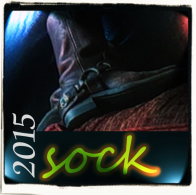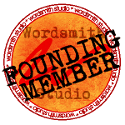
I love this sign from Atlantic Center for the Arts, which comes on the heels of a sign asking the public not to venture beyond a point where the center is reserved for artists. c Elissa Field
I’m joining in Wordsmith Studio’s 3rd Anniversary Blog Hop, today — responding to a great Q & A about my (recent) writing challenges or successes, and the tools, strategies or resources that help me succeed.
Being a little funny, there, calling it a “great” prompt, as I was actually the one to write it. This is the third week I’ve hosted the WSS blog hop for writers, for our anniversary month.
I encourage you to go over and check out the hop. You don’t have to be a member of the writing group to join in. Do jump around and read the various posts. Particularly this week — it would be great if you shared a post with your own writing challenges and your tools or strategies for success. I’ll post links to the hop down below.
But not yet. First, here’s the interview.
* * * * *
Q & A: My Writing Challenges (or Successes) and the Tools, Strategies or Resources That Help Me Succeed – Part 1
1) What are you currently working on?
My work is split between my business (freelance nonfiction, writing & editing), my Masters (writing and research related to curriculum & learning) and fiction. I occasionally write short stories (have a had a few published, a couple awards — small fry), but spend most of my time on novels. I work toward literary fiction, or what is referred to as crossover or book club fiction — literary fiction with commercial appeal.
I am working on a novel called Never Said (it was nicknamed Wake elsewhere on the blog). It trines between the U.S., Ireland and the Middle East, with one couple’s love affair unraveling a tension of what it is to live “without war” in an era when war touches everything.
As tools go: I use Outlook to block out time for business, masters and fiction, and to keep to do lists with weekly steps that help keep me moving forward in all 3 goals. I share goals with friends and with a life coach, to organize my goals and keep me accountable.
2) In recent past, what was your greatest joy or greatest challenge?
I have been impatient to complete this novel — but it was challenging, as it was the first one I attempted where the idea wasn’t that clear when I started writing. I knew the main characters and understood an essential tension, but had to go deep into research to understand the international context, and then deeper into character to develop the motivation and parallel stories that drive each.
It’s easy to get impatient when you feel like you should be able to have finished by now (twice, I thought I was revising a final draft), but as I work on this 8th draft, it is obvious that I had to work this long to understand the story that I had only sensed in the earlier versions. A fast version would have “worked,” but wasn’t compelling. Being willing to pull up and start over let me find the real story. And, of course, hard work teaches valuable lessons.
The greatest joy is that I love the newer material.
As resources go: 2 books on writing offered some good tools for targeting and addressing weak areas in my narrative or characters: Ann Hood’s Creating Character Emotions, and Donald Maass’s Writing 21st Century Fiction: High Impact Techniques for Exceptional Storytelling
3) What challenge are you working through now?
Time is always an issue — especially right now, as I restarted my business and am busy with my kids — so any time delays are aggravating. I had a tree fall across my windshield 2 weeks ago, so groaned over the time spent getting it fixed. Same goes for lags in technology, or time spent marketing for work.
It’s not just about having time to write every day, but wanting those writing hours to be end-zone-level productive.
Transitioning between drafts means that I am pulling successful scenes from several documents in Word to build the new draft. Last summer, on the last draft, I did this simultaneously in Word and Scrivener; Scrivener has won me over, so I may be assembling this draft just in Scrivener. Although it sometimes slows me down to have to set up all the preferences, I like the ability to see each scene as a discreet piece in Scriv. Much of my writing in recent months involved re-envisioning existing scenes — the ‘notecard’ view helps me locate, compare or replace previous versions, and to readily sort scenes that will be re-ordered in the final draft. The challenge, though, when working from multiple drafts is staying organized.
As tools go: I believe in Scrivener enough that I’ve include a link to their site in my sidebar. If you don’t know much about the software, click the picture here to check it out (if it takes you to a “buy” page, click the banner for the homepage for more about…). They are generous in offering a 30 nonconsecutive-day free trial, which allows you a lot of time to play with it before having to pay.
4) For work you are just planning or starting, what challenges or growth are you expecting or hoping to encounter?
I’ve drafted novels and met with agents face-to-face before, but this will be my first foray into blind querying. I’ve practiced pitching and spitballing at conferences and workshops in the last year, and gotten an agent’s feedback on a query draft.
As for strategies: It’s worth noting that attempting to draft a query or plan pitches and log lines during different face-to-face activities with peers and agents is part of what helped me know when I didn’t have a clear sense of the story. Writing pitches and queries ended up being a great strategy for understanding my narrative structure.
5) What have successes or challenges in your work (recently) taught you?
Well, the thing I just mentioned. Having come from a literary background where these things aren’t brooded on as much as word choice and such, I was surprised how important plot structure, narrative arc, suspense and other elements more typically suited to screenwriting have been, as tools in my revisions.
As resources go: the sign at the top of this post was from a workshop I participated in last January (Blue Flower Writers Workshop at Atlantic Center for the Arts), where Ben Percy was the clearest I’ve heard in talking about structure and suspense, even in literary writing.
6) What obstacles or challenges have you not been able to overcome, or still frustrate you? Is there a “magic wand” you would invent to solve this problem?
Yes, I want Hermione’s time turner — to be able to use the same hour to address multiple priorities. It’s not that I don’t have the time. Keeping time to write (fiction) every week is a nonnegotiable for me — I am stubborn in crafting the rest of my life around it, even while running a business or when I teach full time. But I still get frustrated to not be done yet.
As tools go: A magic wand that pulls the story straight out of my head would be great. As strategies go: here are other posts I’ve written on time management strategies for writers.
To Be Continued…
There are 2 more questions to the Q & A, asking how I would define a great writing week and what specific tools and strategies help me succeed. Those answers are long enough that I’m going to let them be a second post.
- Follow this blog to get an update when Part 2 posts
- Visit the original post on Wordsmith Studio’s site
- My post for Week 1 of the Blog Hop:
* * * * *
How About You? Join in the Blog Hop!
What successes or challenges are you working through, and what tools, resources or strategies help you succeed?
I’d love to hear your answers in the comments. Better yet, if you are reading this 4/29-5/4, join in the blog hop by using the linky tool below. Visit the initial prompt, with all 8 questions and more explanation of “how to hop,” on Wordsmith Studio’s site: Writers’ Homecoming Blog Hop – Week 3.
Powered by Linky Tools
Click here to enter your link and view this Linky Tools list…
If you like the idea of more blog hops, let me know, as I may host them in the future on this site.
* * * * *
If you like this blog, be sure to click the WordPress +follow button, or subscribe via email or Bloglovin options in the sidebar if you don’t have a WordPress account. You can find me on Twitter @elissafield or on Facebook. I love to connect with readers and writers.




















Great questions, indeed. And I enjoyed reading your personal answers. I want one of those magic wands!!
LikeLiked by 1 person
Thanks for sharing your experiences with us and for hosting the anniversary blog hop. I’m glad to hear you might host future hops.
LikeLike
Great post!
Time to write, organize old material, get out and explore my new home city, and just have a life, has always been an issue for me.
As a cyclist/walker/mass transit user (I have never owned a car) I am forced to live with the variable work schedule I get every week, with only 3 wks notice ahead of each new schedule….When those schedules have me working on days I could be attending some event such as an Open Mic, or church, or be out exploring, or have more time to do writing and organizing it can be discouraging.
Asking for a set schedule of days & /or daily time period is out of the question as it might affect my ability to work 38-40 hours a wk.
i have had Scrivener for a while, but have yet to find time to to explore it and learn to use it.
LikeLike